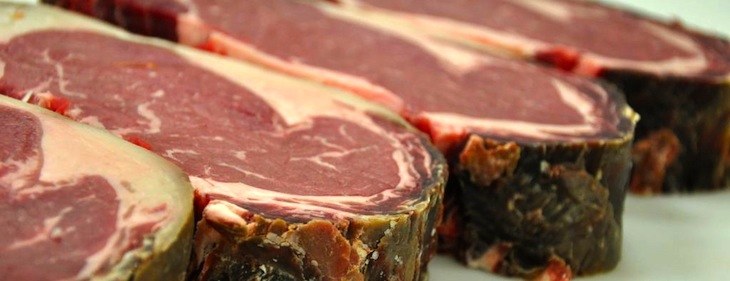Beef prices for consumers rise to record levels in April
by May 18, 2020 5:39 pm 948 views

Consumers wanting steaks, tacos and burgers paid record high prices for fresh and choice beef, according to the May 12 Daily Livestock Report by the U.S. Department of Agriculture.
The all fresh retail beef price averaged just over $5.94 per pound for the first three months of the year. In April, the price rose 4.4% in one month to $6.22 per pound, the highest recorded monthly price for the series. Similarly, choice grade retail beef price jumped 6.6% in one month to its highest recorded monthly price of $6.44 per pound in April.
Higher retail beef prices come as meatpackers continue to run plants at reduced capacity during the COVID-19 pandemic. Packer margins are high even as they face increased costs of operating at reduced capacities, putting more safeguards in plants to protect workers, bonus pay, and also paying workers who are sick or uncomfortable to return to work.
Despite the record-high prices consumers continue to stock up on beef and other meats when they can find them. IRI reports total meat sales were up 38.5% in dollars and 24.1% in volume for the four weeks ending May 10, compared to the same period last year. Beef dollar sales rose 47%, while volumes increased by 35.7% in the four-week period.
Agriculture Economist John Anderson of the University of Arkansas said meat prices are lofty and there doesn’t seem to be a ceiling. He said there is plenty of meat in the supply chain but the hiccups in the processing sector have kept supplies reaching grocery stores much lighter than normal. He said the spread between wholesale and retail is widening but as long as consumers are willing to pay the prices there won’t likely be any retreat. He said despite record-high prices there is likely no one along the supply chain making any much money.
He said cattle prices have been depressed for farmers and packers have had much higher operating costs. Local grocery store manager Steve Morrow at Allen’s in Bella Vista has said his wholesale prices have also risen significantly in recent weeks. He also said there is no ability to lock in prices for promotions because they change daily.
Pork has been in shorter supply, but consumers are willing to paying more when they can find it. The retail price of pork increased by 1.2% in April, to $3.39 a pound. Despite the uptick, it is still well below the record price of $4.21 per pound in September 2014, according to USDA.
Chicken prices have also risen amid the COVID-19 crisis. April retail prices of whole fresh chicken jumped 12.2% to $1.57 per pound, the third-highest monthly price for poultry, behind the $1.59 a pound recorded in June 2019 and the $1.57 a pound in August 2014. Before April’s jump, the product averaged $1.39 a pound for the first quarter of the year, less than the $1.47 a pound for the first three months of 2019, USDA reported.
Prior to COVID-19, U.S. chicken supplies were abundant and prices were depressed. But with a number of plants catering to foodservice and the demise of that sector, chicken operations have suffered overall. Anderson said speaking to various growers around the state, the impact has been mixed.
“Those growers whose complexes serve foodservice have been out of production for up to 60 days. Others have seen no downtime in between their flocks,” Anderson said.
When asked how long high meat prices are likely to persist, Anderson said it depends on how quickly plants can resume more normalized capacity. He said prices could rise further and the breaking point will be determined when consumers stop buying the products.
